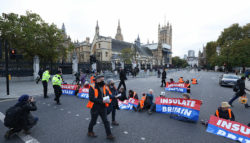The Right to Protest or The Right to Annoy?
By Jacob Proffitt
Few people will have missed the sight of insulate Britain protesters demonstrating across the country in recent months. Whist the group has attracted some support, their actions ultimately prompted the National Highways agency to obtain an injunction effectively banning the group from protesting across England’s roads.
Under current UK law, by violating the injunction, individual members of the group are at risk of prosecution or fine, indeed some have already appeared in court and sentenced to spend Christmas behind bars.
Whether you agree or disagree with the methods and motivations of Insulate Britain is another story, our focus instead should be on a crucial point – was it right that the protestors were arrested in the first place?
Under Article 11 of the European Convention of Human Rights (which the UK was the first nation to ratify in 1951) freedom of assembly is guaranteed, allowing everyone (whether we agree with their cause or not) to protest, march and demonstrate. The Convention goes even further, prohibiting police and other domestic security forces from restricting this right excessively, charging them with a duty to protect peaceful protestors from harm.
Whilst reasonable and proportionate restrictions to public protests are nothing new in the UK, the Government’s proposed Police, Crime, Sentencing and Courts Bill is set to make a significant change in this area. The Bill is currently being considered (again) in the House of Lords, after being first introduced by the Government earlier this year in March.
The Bill covers a vast area of areas, but it is Part 3 of the Bill which would directly effect the right to protest, largely seen as introduced in response to the high-profile protests of Extinction Rebellion and Black Lives Matter in recent years.
In its current form the Bill extends police powers, allowing them to impose conditions on protests, processions and assemblies. These conditions or limits could include restrictions on the noise and duration of a protest if it is “reasonably believed” that the event “may result in serious disruption to the activities of an organisation which are carried out in the vicinity of the protest or a significant impact on persons in the vicinity”. It is understood that such a test would be satisfied if a protest or gathering caused others, “serious unease, alarm or distress”.
You don’t need to be a lawyer to realise that the language and terminology in the bill is notably vague, and worryingly open to interpretation, ask two different people what amounts to “unease, alarm or distress” and you would probably get two very different answers, now apply that thought experiment to the right to protest.
The Bill’s provisions also beef up the current common law offence of “Public Nuisance” defined under the legislation as “acts which cause serious harm to a person, where a person suffers serious distress, annoyance, inconvenience or loss of amenity as a result of the conduct of the person accused”. With a maximum proposed sentence of 10 years imprisonment.
I now ask you to recall your first thoughts and reactions to the sight of Insulate Britain protestors, blocking roads, cluing their hands to roads and vehicles, inconveniencing drivers – were you annoyed?
Annoyance and irritation are emotions, and like any emotion they are significantly diverse and subjective. The use of such potentially broad terminology as a condition of criminalising a universal and foundational democratic right is irresponsible and could potentially lead to the fundamental right of protest being disproportionality impacted as a result.
Lastly, two important facts need to be emphasised, first at the time of writing the Bill has yet to come into legal force, and second, no law is applied retrospectively in the UK. That being said, given how willing members of Insulate Britain have been in violating court ordered injunctions, it certainly seems unlikely that they will fall into line and abandon their cause without incident once the Bill becomes law.
Jacob Proffitt - MSc Political Science

